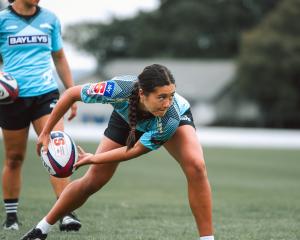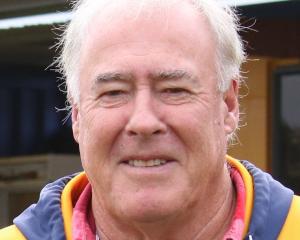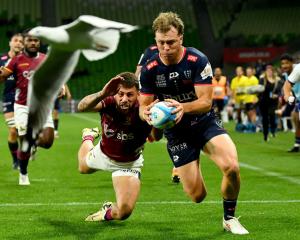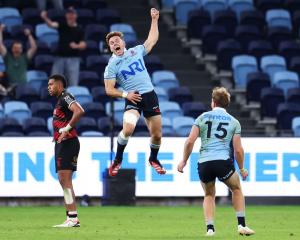
New Highlanders halfback Fumiaki Tanaka, heading for Super Rugby along with his Panasonic team-mate Shota Horie (Rebels), looks set to make an impact and lead the way for more.
"I'm not sure if I am a pioneer," says Tanaka, "I am just on the starting line. I know I am one of the first but I haven't proved myself - I have just opened the door. I have to be very successful with the Highlanders, otherwise it won't mean much."
Tanaka seems well placed to succeed, given how the role of the No 9 has evolved in recent years.
"I guess we are moving away from the bigger halfbacks," says Otago coach Tony Brown, "like the [Justin] Marshalls and the [Byron] Kellehers, and speed has become all-important.
"Aaron Smith has set a new standard but Tanaka is probably the only halfback in New Zealand who could be faster across the ground than him, so he has a great chance of making an impact."
The former All Black is well qualified to judge, having observed Tanaka blossom in five years at Panasonic. He is modest but has had a huge impact on the 27-year-old's career.
"Tanaka was probably ranked fifth or sixth in the national system when he was at university," says leading Japanese rugby journalist Rich Freeman. "Then Tony took him under his wing at Sanyo [now Panasonic] and he has developed immensely beside him."
"Tony made me work a lot harder," says Tanaka. "I learned so much off him and liked rugby more than ever. He was one of the most important influences on my career."
Tanaka, who also played for Auckland under-19s during a brief spell in New Zealand, was taken to Otago by Brown this year and soon won over the Southern fans.
"Going to New Zealand has shown him what is possible," says Brown, "but also shown him what it takes to make it at the next level."
The effect is immediately obvious. At his final Panasonic training session last week, Tanaka stood out, as he zipped around the field one step ahead of many team-mates. At the end of the session, when most have gone inside for a post training onsen (Japanese hot spa), Brown and Tanaka remain out on the field.
It is a cold winter's day in Ota, a satellite city 100km north of Tokyo, as the wind whistles off the hills but Brown is passing on some final pre-departure tips. He wants Tanaka to work on his box kicking and the duo punt balls repeatedly up and down the pristine field.
Tanaka is known as one of the jokers in the team, leading the way with karaoke as well as many other club activities.
"Fumi is one of those guys that you just can't embarrass," says Panasonic team-mate and former All Black Mike Delany. "No matter what the situation, he will always turn it around and make it you the one who is embarrassed."
Of no laughing matter is the impending physical challenge. He was the smallest player at the 2011 Rugby World Cup but it is only when you see the 1.66m, 74kg Tanaka in person that you realise how diminutive he is. How will he cope with some of the monsters of Super Rugby?
"He should handle it okay," says Brown. "He only goes for the ankles when he is tackling, which keeps him out of trouble. The main thing is his speed - both of his pass and across the ground. It means he can create space for other players."
"It was very physical in the ITM Cup and obviously it will be even more physical in Super Rugby," says Tanaka, "so that will be a challenge.
But the pace of the game in Top League [the Japanese club competition] is quite fast and I need that tempo at the Highlanders.
"Hopefully going overseas to play will have a good influence on some of the younger players in Japan. I'm nervous obviously but I am representing Japan and I need to stand up to the challenge. I also need to repay the people in Otago who have looked after me really well."
"What he is doing is huge, really," says Brown. "If players here can see that there are more pathways in the sport, it will really help its development."
- Michael Burgess in Tokyo











